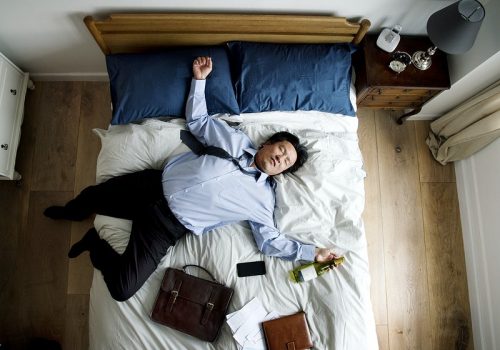Stress is a normal part of a person’s life. However, excessive and persistent fear and worry about the future and everyday situations of life can interfere with your daily activities. This can be a sign of mental disorder.

Definition Of Anxiety
What is anxiety frequently? Anxiety is described as the feeling of worry, fear, or uneasiness. If one experiences this, they anticipate what will happen in the future. Anxiety disorder is often associated with fear and avoidance and can trigger a fight or flight reaction or panic attacks. In some cases, this can be a normal reaction to stress. For instance, a person can feel anxious before an important event, before making a big decision, or when facing a problematic situation.
There are various opinions from people who’ve had anxiety, including psychological and physical symptoms. It can be incapacitating, particularly when it causes panic episodes. People coping with this are often apprehensive when they do their everyday activities, and they feel as though their fear overpowers their lives. In a number of cases, individuals may turn to drugs, alcohol, and other substances to self-medicate and find relief from their symptoms. But most of them are aware that substance use can ultimately make their manifestations worse and result in addiction.
Symptoms
Physical symptoms of anxiety may include nausea, insomnia, fast heartbeat, sweating, headaches, shortness of breath, and dizziness, among others. Different types of anxiety disorders can have different effects.
Psychological symptoms include distress, persistent worry, difficulty focusing, exaggerated mental repetition of problems or thoughts, agitation, and inability to relax.
Prevalence In The Population
Anxiety is one of the most common mental health disorders worldwide. According to the World Health Organization (WHO), an estimated 264 million people globally suffer from an anxiety disorder, which represents 3.6% of the world’s population. Even children can have the disorder — it’s not just them feeling worry about problematic situations.
In the United States, anxiety disorders are the most common mental health condition, affecting approximately 40 million adults, or 18.1% of the population each year. The prevalence of anxiety disorders is higher among women than men.
The onset of anxiety disorders often occurs during childhood or adolescence, and they tend to be chronic and recurrent if left untreated. The long-term impact on an individual’s mental and physical health, as well as their quality of life, underscores the importance of early detection and treatment.
It is important to note that the prevalence of anxiety may be underestimated due to underreporting these disorders, lack of access to mental health services, and stigma associated with mental illness.
How It Impacts Daily Life
How anxiety disrupts daily life varies from individual to individual and is dependent on their symptoms and triggers. Different types of anxiety can happen in different places. Social situations might cause one kind, while leaving a loved one might cause separation anxiety. People with anxiety disorders might also experience generalized anxiety.
It Can Make Even Daily Chores Daunting.
A person confronted with anxiety may be doing their usual routines when instantly a trigger causes them to become short of breath, tense, and dizzy. For instance, someone with social phobia may abruptly experience extreme panic and fear when asked to talk in front of many people. Their fear may be so extreme that they are incapable of speaking and should quickly get out of the room he is in. Not being aware when anxiety occurs can cause stress and uncertainty.
It Can Negatively Affect Your Health.
Anxiety can cause many health problems in the health. This can include digestive issues, neurological problems, and cardiovascular problems. If one feels constantly stressed and worried, the immune system can be damaged in the long run.
It Can Negatively Affect Your Relationships.
Since persons with anxiety tend to limit their willingness to explore and try new things, most limit their chances to meet new friends. The negative patterns and beliefs of a person can ruin relationships. They tend to focus on their worries and fears rather than focusing on the relationship and the present situation. Further, some have the tendency to isolate themselves from social interaction. Also, people with anxiety can be short-tempered and easily gets angry with people they cared about.
It Can Negatively Affect The Quality Of Life.
A person’s quality of life can be greatly impacted if they have anxiety. Since they live in fear, they are scared to explore and try new things. This limits their capacity to improve their potential. Though they see themselves achieving something in their lives, their anxiety hinders them to achieve what they want. In some cases, they find it difficult to leave their house or to meet other people. Their education, employment, and generally the quality of life can be greatly affected.

Importance Of Addressing It For Mental Health
Addressing Is Crucial For Overall Mental Health And Well-Being.
Anxiety can have a significant impact on an individual’s daily life, relationships, and ability to function at school or work. Left untreated, anxiety can lead to other mental health conditions, such as depression, substance use disorders, and even suicide.
It Can Also Have A Negative Impact On Physical Health.
Prolonged periods of stress and anxiety can lead to high blood pressure, heart disease, and other chronic health conditions. Additionally, anxiety can weaken the immune system, making individuals more susceptible to illnesses.
Addressing The Problem Is Critical For Both Mental And Physical Health.
It is important to recognize the signs and symptoms and seek help from a healthcare provider if needed. With proper treatment and support, individuals can successfully manage their anxiety and improve their overall well-being.
Fortunately, effective treatments are available, such as psychotherapy, medication, and lifestyle changes. Early intervention and treatment can prevent the symptoms from worsening and improve an individual’s overall quality of life.
Its Effects On Mental Health
Anxiety can have a significant impact on mental health, affecting an individual’s thoughts, feelings, and behavior. Here are some of the effects of anxiety on mental health:
1. Co-occurring Mental Health Conditions
Anxiety often co-occurs with other mental health conditions such as depression, bipolar disorder, and substance use disorders. These conditions can worsen each other and make it harder to manage symptoms.
2. Its Relationship With Depression
Anxiety and depression frequently co-occur and share many symptoms. The two conditions can worsen each other and create a vicious cycle of negative thoughts and feelings.
3. Negative Thinking Patterns
Anxiety can lead to negative thinking patterns, such as catastrophizing and rumination. This can make it difficult to focus on positive aspects of life and can lead to a sense of hopelessness.
4. Physical Symptoms
Anxiety can cause physical symptoms such as heart palpitations, sweating, and trembling. These physical symptoms can be distressing and can exacerbate anxiety symptoms.
5. Self-Esteem And Confidence
Anxiety can negatively impact self-esteem and confidence. Individuals may feel like they are not capable of handling certain situations, which can lead to feelings of inadequacy and low self-worth.
Anxiety can have a significant impact on mental health, affecting an individual’s daily life, relationships, and ability to function. It is important to seek help from a healthcare provider if you are experiencing symptoms to prevent further negative impacts on mental health.
Additional information about anxiety is seen below through these frequently asked questions and their corresponding answers.
Are There Simple Words For The Mental Health?
Anxiety is restlessness or distress of the mind caused by an extreme fear of endangerment or mishap. Almost always, individuals diagnosed with this mental health condition are often worried. There could also be physical indications, such as experiencing stomach problems or headaches.
How Do You Know What Causes Your Worry Thoughts?
You may learn and recognize your triggers by first starting a journal. Observe when your anxiety is noticed, and then document what might have led you to experience your trigger. You can also work with a professional, like a counselor or therapist. There are anxiety triggers that are hard to recognize, but a mental health professional is qualified to help you. Finally, you must be true to yourself.
Enumerate The 6 Different Variations Of This Mental Health Disorder.
The six variations of an anxiety disorder include:
- Specific phobia
- Panic disorder
- Agoraphobia
- Separation Anxiety Disorder
- Social Anxiety Disorder
- Generalized Anxiety Disorder
How Do You Fix This Mental Health Condition?
Anxiety disorders have multiple solutions. You can fix anxiety by:
Engaging In Physical Activity.
Exercise is great for mental and physical health. It can release endorphins (feel-good hormones) and other natural chemicals in the brain that can improve your mood.
Avoiding Too Much Alcohol
Alcohol consumption can worsen the symptoms. Most studies suggest that quitting alcohol can lessen the symptoms of panic attacks and anxiety. In general, quitting alcohol can be a good start to improve a person’s mental health.
Quitting Drinking Too Much Coffee Or Drinks That Contain Caffeine
Drinking less coffee or eliminating caffeine totally can alleviate the symptoms of anxiety. Much research suggests that there is a link between anxiety and overconsumption of caffeine.
Getting Enough Sleep
Not getting enough sleep can worsen the symptoms. According to some lab experiments, a person who gets to have more deep sleep at night is more likely to experience fewer symptoms of anxiety the next day.
Meditating And Practicing Other Relaxation Strategies
To experience calmness, meditation, and other relaxation strategies can be very effective. Evidence suggests that engaging in meditation can help the person manage the symptoms.
Doing Deep Breathing Exercises.
When a person breathes slower and more deeply, the body signals the nervous system of the person to relax and calm down. In this matter, symptoms can be manageable.
Are There Best Treatments For This Mental Health Condition?
SSRIs or Selective Serotonin Reuptake Inhibitors are primarily thought of as the best treatment for generalized anxiety disorder. Antidepressants or TCAs are suggested for panic disorder and are also considered potent for both panic and generalized anxiety disorder.
Are There Vitamins That Can Help In Alleviating Its Symptoms?
Ashwagandha, L-theanine, valerian root, magnesium, and vitamin D are common supplements that help with anxiety.
Why Did I Develop This Mental Health Condition?
Experts have discovered that anxiety disorder is genetic and that these disorders have a biological origin, similar to diabetes, allergies, and other diseases. Anxiety may result from a complicated group of risk factors, which include brain chemistry, family history, life situations, and individual personality.
What’s Its Root Cause?
Stress has been known to be a contributor to the progression of anxiety and depression. Anxiety disorders can also be the result of long-term increases in cortisol and stress hormones originating from the adrenal gland. These hormones have also been associated with severe anxiety and depression.
How Long Can The Mental Health Last?
Anxiety symptoms usually peak in ten minutes, and they seldom last for over 30 minutes. However, during this short period, you may experience fear so intense that you could feel as though you’re going to die or completely lose control.
Can It Go Away By Itself?
The first form of anxiety will disappear by itself. The second one may not go away. Most people who are diagnosed don’t completely get rid of their anxiety. But they can actually learn to manage their emotions and tremendously decrease the level of their anxiety by going through therapy or taking medications if necessary.
What Vitamin Deficiency Causes This Mental Health Condition?
Some experts suggest that being vitamin D deficient could also cause you to develop an anxiety disorder. For instance, a study performed five years ago documented that individuals with anxiety or depression symptoms also had decreased calcidiol, a derivative of vitamin D, within their bodies.
Can This Mental Health Condition Be Considered A Mental Illness?
Random episodes of anxiety are okay, but a diagnosis of anxiety disorder is not that simple. Anxiety disorders are a range of mental health conditions that trigger persistent and tremendous anxiety and worry. The severe anxiety could cause you to avoid school and work life, family gatherings, and other social events that may elicit or aggravate the anxiety symptoms.
How Can I Control My Constant Worries Without Medication?
You can control your anxiety without taking any medications by trying these simple steps:
- Staying active regularly is beneficial for your mental and physical health.
- Do not consume too much alcohol and caffeine.
- Quit smoking.
- Get sufficient sleep.
- Practice mindfulness and meditation.
- Eat a healthy and well-balanced diet.

Why Does A Person Become Frequently Worried?
What Are The Effective Tips For Managing This Mental Health Disorder?
Is It Normal To Have Constant Worries?
How Do Frequent Worries and Panic Impact One’s Daily Routine?
Who Is Most Likely To Have This Mental Health Condition?
The Bottom Line
Aside from the tips mentioned above, there are also other equally significant habits that you can learn to cope with your anxiety, and scheduling your worry time is one of them. It may sound weird to plan on worrying, but doctors essentially suggest that you choose a time to contemplate your anxieties intentionally. Spend 30 minutes to find out what’s troubling you and look for ways that you can do to make them better. Do not delve into the what-ifs. Concentrate on what really causes your anxiety.
Additionally, you can play a role in your community by doing good deeds for others. This can help take your mind off of your problems. Do other things for your community, such as volunteering, or donating school supplies or books to the public library. This will feel rewarding, plus you’ll gain a support system and connections that will benefit you.
Finally, identify your triggers. Think of the moments and locations where you observe yourself feeling most worried. Jot them down if you have to. Find patterns and seek ways that you can either evade or face the emotions of worry and panic. If you can identify your anxiety triggers, this can definitely help you put your fears and uncertainties into perspective. Soon, you’ll be more ready when they come to you.
